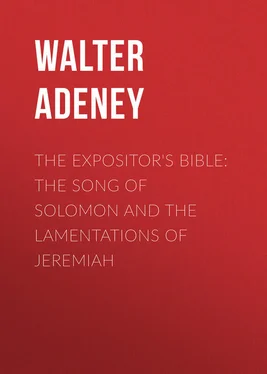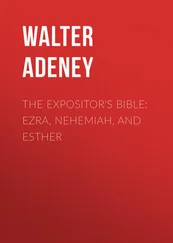Walter Adeney - The Expositor's Bible - The Song of Solomon and the Lamentations of Jeremiah
Здесь есть возможность читать онлайн «Walter Adeney - The Expositor's Bible - The Song of Solomon and the Lamentations of Jeremiah» — ознакомительный отрывок электронной книги совершенно бесплатно, а после прочтения отрывка купить полную версию. В некоторых случаях можно слушать аудио, скачать через торрент в формате fb2 и присутствует краткое содержание. Издательство: Иностранный паблик, Жанр: foreign_religion, foreign_antique, foreign_prose, на английском языке. Описание произведения, (предисловие) а так же отзывы посетителей доступны на портале библиотеки ЛибКат.
- Название:The Expositor's Bible: The Song of Solomon and the Lamentations of Jeremiah
- Автор:
- Издательство:Иностранный паблик
- Жанр:
- Год:неизвестен
- ISBN:нет данных
- Рейтинг книги:3 / 5. Голосов: 1
-
Избранное:Добавить в избранное
- Отзывы:
-
Ваша оценка:
- 60
- 1
- 2
- 3
- 4
- 5
The Expositor's Bible: The Song of Solomon and the Lamentations of Jeremiah: краткое содержание, описание и аннотация
Предлагаем к чтению аннотацию, описание, краткое содержание или предисловие (зависит от того, что написал сам автор книги «The Expositor's Bible: The Song of Solomon and the Lamentations of Jeremiah»). Если вы не нашли необходимую информацию о книге — напишите в комментариях, мы постараемся отыскать её.
The Expositor's Bible: The Song of Solomon and the Lamentations of Jeremiah — читать онлайн ознакомительный отрывок
Ниже представлен текст книги, разбитый по страницам. Система сохранения места последней прочитанной страницы, позволяет с удобством читать онлайн бесплатно книгу «The Expositor's Bible: The Song of Solomon and the Lamentations of Jeremiah», без необходимости каждый раз заново искать на чём Вы остановились. Поставьте закладку, и сможете в любой момент перейти на страницу, на которой закончили чтение.
Интервал:
Закладка:
"Wherefore doest thou forget us for ever,
And forsake us so long time ?" 106 106 v. 20.
A recent attempt to assign the last two elegies to the age of the Maccabees has entirely broken down. The points of agreement with that age which have been adduced will fit the Babylonian period equally well, and the most significant marks of the later time are entirely absent. Is it conceivable that a description of the persecution by Antiochus Epiphanes would contain no hint of the martyr fidelity of the devout Jews to their law which was so gloriously maintained under the Maccabees? The fourth and fifth elegies are as completely silent on this subject as the earlier elegies.
The evidence that points to any diversity of authorship is very feeble. The fifth elegy may have been written years later than the rest of the book, and yet it may have come from the same source, for the example of Tennyson shews that the gift of poetry is not always confined to but a brief interval in the poet life. The other distinctions are not nearly so marked as some that may be observed in the recognised poems of a single author – for example, the amazing differences between the smooth style of The Idylls of the King and the quaint dialect of The Northern Farmer . Though some differences of vocabulary have been discovered, the resemblances between all the five poems are much more striking. In motive and spirit and feeling they are perfectly agreed. While therefore in our ignorance of the origin of the Lamentations, and in recognition of the variations that have been indicated, we cannot deny that they may have been collected from the utterances of two or even three inspired souls, neither are we by any means forced to assent to this opinion; and under these circumstances it will be justifiable as well as convenient to refer to the authorship of Lamentations in terms expressive of a single individual. One thing is fairly certain. The author was a contemporary, an eye-witness of the frightful calamities he bewailed. With all their artificiality of structure these elegies are the outpourings of a heart moved by a near vision of the scenes of the Babylonian invasion. The swift, vivid pictures of the siege and its accompanying miseries force upon our minds the conclusion that the poet must have moved in the thick of the events he narrates so graphically, although, unlike Jeremiah, he does not seem to have been a leading actor in them. Children cry to their mothers for bread, and faint with hunger at every street corner; the ghastly rumour goes forth that a mother has boiled her baby; elders sit on the ground in silence; young maidens hang their heads despairing; princes tremble in their helplessness; the enemy break through the walls, carry havoc into the city, insolently trample the sacred courts of the temple; even the priest and the prophet do not escape in the indiscriminate carnage; wounded people are seen, with blood upon their garments, wandering aimlessly like blind men; the temple is destroyed, its rich gold bedimmed with smoke, and the city herself left waste and desolate, while the exultant victors pour ridicule over the misery of their prey. A later generation would have blurred the outline of these scenes, regarding them through the shifting mists of rumour, with more or less indistinctness. Besides, the motive for the composition of such elegies would vanish with the lapse of time. Still some few years must be allowed for the patriot's brooding over the scenes he had witnessed, until the memory of them had mellowed sufficiently for them to become the subjects of song. The fifth elegy, at all events, implies a considerable interval. Jerusalem was destroyed in the year B.C. 587; therefore we may safely date the poems from about B.C. 550 onwards — i. e. , at some time during the second half of the sixth century. What is of more moment for us to know is that we have here no falsetto notes, such as we may sometimes detect in Virgil's exquisite descriptions of the siege of Troy, for the poet has witnessed the fiery ordeal the recollection of which now inspires his song. Thus out of the unequalled woes of Jerusalem destroyed he has provided for all ages the typical, divinely inspired expression of sorrow – primarily the expression of sorrow – and then associated with this some pregnant hints both of its dark relationship to sin and of its higher connection with the purposes of God.
CHAPTER III
THE THEME
No more pathetic subject ever inspired a poet than that which became the theme of the Lamentations. Wave after wave of invasion had swept over Jerusalem, until at length the miserable city had been reduced to a heap of ruins. After the decisive defeat of the Egyptians at the great battle of Carchemish during the reign of Jehoiakim, Nebuchadnezzar broke into Jerusalem and carried off some of the sacred vessels from the temple, leaving a disorganised country at the mercy of the wild tribes of Bedouin from beyond the Jordan. Three months after the accession of Jehoiakin, the son of Jehoiakim, the Chaldæans again visited the city, pillaged the temple and the royal palace, and sent the first band of captives, consisting of the very élite of the citizens, with Ezekiel among them, into captivity at Babylon. This was only the beginning of troubles. Zedekiah, who was set up as a mere vassal king, intrigued with Pharaoh Hophra, a piece of folly which called down upon himself and his people the savage vengeance of Nebuchadnezzar. Jerusalem now suffered all the horrors of a siege, which lasted for a year and a half. Famine and pestilence preyed upon the inhabitants; and yet the Jews were holding out with a stubborn resistance, when the invaders effected an entrance by night, and were encamped in the temple court before the astonished king was aware of their presence. Zedekiah then imitated the secrecy of his enemies. With a band of followers he crept out of one of the eastern gates, and fled down the defile towards the Jordan; but he was overtaken near Jericho, and conveyed a prisoner to Riblah; his sons were killed in his very presence, his eyes were burnt out, and the wretched man sent in chains to Babylon. The outrages perpetrated against the citizens at Jerusalem as well as the sufferings of the fugitives were such as are only possible in barbarous warfare. Finally the city was razed to the ground and her famous temple burnt.
The Lamentations bewail the fall of a city. In this respect they are unlike the normal type of elegiac poetry. As a rule, the elegy is personal in character and individualistic, mourning the untimely death of some one beloved friend of the writer. It is the revelation of a private grief, although with a poet's privilege its author calls upon his readers to share his sorrow. In the classic model of this order of verse Milton justifies the intrusion of his distress upon the peace of nature by exclaiming —
"For Lycidas is dead, dead ere his prime,
Young Lycidas, and hath not left his peer.
Who would not sing for Lycidas?"
And Shelley, while treating his theme in an ethereal, fantastic way, still represents Alastor, the Spirit of Solitude, in the person of one who has just died, when he cries —
"But thou art fled,
Like some frail exhalation which the dawn
Robes in its golden beams, – ah! thou hast fled!
The brave, the gentle, and the beautiful,
The child of grace and genius."
Gray's well-known elegy, it is true, is not confined to the fate of a single individual; the churchyard suggests the pathetic reflections of the poet on the imaginary lives and characters of many past inhabitants of the village. Nevertheless these cross the stage one by one; the village itself has not been destroyed, like Goldsmith's "Sweet Auburn." Jeremiah's lamentation on the death of Josiah must have been a personal elegy; so was the scornful lament over the king of Babylon in Isaiah. But now we have a different kind of subject in the Book of Lamentations. Here it is the fate of Jerusalem, the fate of the city itself as well as that of its citizens, that is deplored. To rouse the imagination and awaken the sympathy of the reader Zion is personified, and thus the poetry is assimilated in form to the normal elegy. Still it is important for us to take note of this distinguishing trait of the Lamentations; they bewail the ruin of a city.
Читать дальшеИнтервал:
Закладка:
Похожие книги на «The Expositor's Bible: The Song of Solomon and the Lamentations of Jeremiah»
Представляем Вашему вниманию похожие книги на «The Expositor's Bible: The Song of Solomon and the Lamentations of Jeremiah» списком для выбора. Мы отобрали схожую по названию и смыслу литературу в надежде предоставить читателям больше вариантов отыскать новые, интересные, ещё непрочитанные произведения.
Обсуждение, отзывы о книге «The Expositor's Bible: The Song of Solomon and the Lamentations of Jeremiah» и просто собственные мнения читателей. Оставьте ваши комментарии, напишите, что Вы думаете о произведении, его смысле или главных героях. Укажите что конкретно понравилось, а что нет, и почему Вы так считаете.












